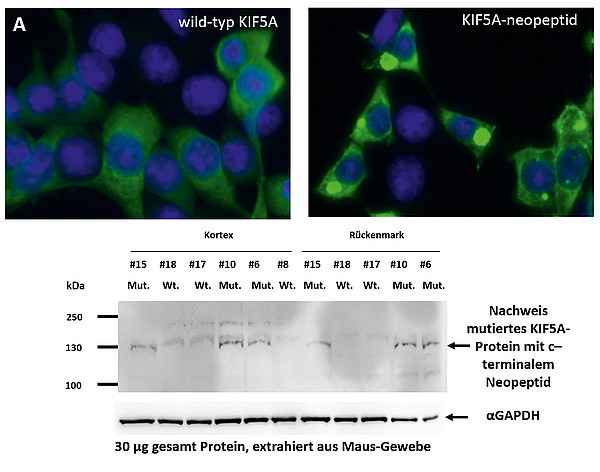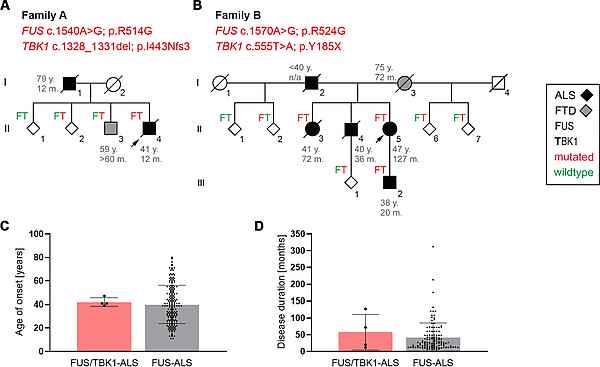Sie befinden sich hier
Inhalt

Senior Attending Physician
Professor of Translational Neurology
Division Chief Neurodegeneration, Department of Neurology
The research group of the Division for Neurodegenerative Diseases studies the genetics and molecular mechanisms of neurodegenerative diseases. The focus is on amyotrophic lateral sclerosis (ALS), Parkinson's disease and other movement disorders. For this purpose, high-throughput sequencing methods such as whole exome sequencing are used to identify new disease genes. The pathogenesis of these diseases is then investigated using standard molecular and cell biological methods as well as state-of-the-art techniques such as spatial genomics and transcriptomics.
Appropriate genetic mouse models, cell-free biochemical approaches, and cell culture methods including patient stem cell-derived cultured human motoneurons are used as disease models. In addition, the Neurodegeneration Section studies changes in innate immunity as well as epigenetic markers of neurodegenerative diseases. The goal is to find new therapeutic targets through a translational strategy and direct validation of research results in patient biospecimens.


Selected national and international joint research projects
- DFG: Uncovering novel causes and modifiers of amyotrophic lateral sclerosis by nuclear and mitochondrial genome sequencing. Duration: 2022 – 2024
- Schwiete foundation: Patient registry Fahr-NET. Duration: since 2021
- Amylyx Pharmaceuticals: Multicenter phase III trial of AMX0034 for ALS treatment (PHOENIX) (NCT05021536). Start: 2021
- BMBF: Investigation of S-oxprenolol compared to established drugs in ALS mouse models (SOXALS). Duration: 2020 – 2023
Legend: DFG = German Research Foundation, BMBF = Federal Ministry of Education and Research
Selected publications
- A TBK1 variant causes autophagolysosomal and motoneuron pathology without neuroinflammation in mice.
Brenner D, Sieverding K, Srinidhi J, Zellner S, Secker C, Yilmaz R, Dyckow J, Amr S, Ponomarenko A, Tunaboylu E, Douahem Y, Schlag JS, Rodríguez Martínez L, Kislinger G, Niemann C, Nalbach K, Ruf WP, Uhl J, Hollenbeck J, Schirmer L, Catanese A, Lobsiger CS, Danzer KM, Yilmazer-Hanke D, Münch C, Koch P, Freischmidt A, Fetting M, Behrends C, Parlato R, Weishaupt JH. J Exp Med. (2024). 221(5):e20221190. doi: 10.1084/jem.20221190 - PSEN1/SLC20A2 double mutation causes early-onset Alzheimer's disease and primary familial brain calcification co-morbidity.
Hebestreit S, Schwahn J, Sandikci V, Maros ME, Valkadinov I, Yilmaz R, Eckrich L, Loghmani SB, Lesch H, Conrad J, Wenz H, Ebert A, Brenner D, Weishaupt JH. Neurogenetics (2023). 24(3):209-213. doi: 10.1007/s10048-023-00723-x - FUS mutations dominate TBK1 mutations in FUS/TBK1 double-mutant ALS/FTD pedigrees.
Brenner D, Müller K, Lattante S, Yilmaz R, Knehr A, Freischmidt A, Ludolph AC, Andersen PM Weishaupt JH. Neurogenetics (2022). 23(1):59-65. doi:10.1007/s10048-021-00671-4 - Haploinsufficiency of TANK-binding kinase 1 prepones age-associated neuroinflammatory changes without causing motor neuron degeneration in aged mice.
Bruno C, Sieverding K, Freischmidt A, Satoh T, Walther P, Mayer B, Ludolph AC, Akira S, Yilmazer-Hanke D, Danzer KM, Lobsiger CS, Brenner D, Weishaupt JH. Brain Commun (2020). 2(2):fcaa133. doi:10.1093/ braincomms/fcaa133 - A serum microRNA sequence reveals fragile X protein pathology in amyotrophic lateral sclerosis.
Freischmidt A, Goswami A, Limm K, Zimyanin VL, Demestre M, Glaß H, Holzmann K, Helferich AM, Brockmann SJ, Tripathi P, Yamoah A, Poser I, Oefner PJ, Böckers TM, Aronica E, Ludolph AC, Andersen PM, Hermann A, Weis J, Reinders J, Danzer KM, Weishaupt JH. Brain (2021). 144(4):1214-1229. doi:10.1093/brain/awab018 - Heterozygous Tbk1 loss has opposing effects in early and late stages of ALS in mice.
Brenner D, Sieverding K, Bruno C, Lüningschrör P, Buck E, Mungwa S, Fischer L, Brockmann SJ, Ulmer J, Bliederhäuser C, Philibert CE, Satoh T, Akira S, Boillée S, Mayer B, Sendtner M, Ludolph AC, Danzer KM, Lobsiger CS, Freischmidt A, and Weishaupt JH. J Exp Med (2019). 216(2):267-278. doi: 10.1084/jem.20180729 - Peripheral monocytes are functionally altered and invade the CNS in ALS patients.
Zondler L, Müller K, Khalaji S, Bliederhauser C, Ruf WP, Grozdanov V, Thiemann M, Fundel-Clemes K, Freischmidt A, Holzmann K, Strobel B, Weydt P, Witting A, Thal DR, Helferich AM, Hengerer B, Gottschalk KE, Hill O, Kluge M, Ludolph AC, Danzer KM, and Weishaupt JH. Acta Neuropathol (2016). 132(3):391-411. doi: 10.1007/s00401-016-1548-y - Haploinsufficiency of TBK1 causes familial ALS and fronto-temporal dementia.
Freischmidt A, Wieland T, Richter B, Ruf W, Schaeffer V, Müller K, Marroquin N, Nordin F, Hübers A, Weydt P, Pinto S, Press R, Millecamps S, Molko N, Bernard E, Desnuelle C, Soriani MH, Dorst J, Graf E, Nordstrom U, Feiler MS, Putz S, Boeckers TM, Meyer T, Winkler AS, Winkelman J, de Carvalho M, Thal DR, Otto M, Brannstrom T, Volk AE, Kursula P, Danzer KM, Lichtner P, Dikic I, Meitinger T, Ludolph AC, Strom TM, Andersen PM, and Weishaupt JH. Nat Neurosci (2015). 18(5):631-6. doi: 10.1038/nn.4000
Kontextspalte
Contact
Medical Faculty Mannheim
Heidelberg University
Theodor Kutzer-Ufer 1-3
68167 Mannheim
jochen.weishaupt@umm.de
